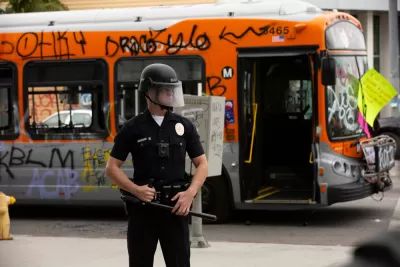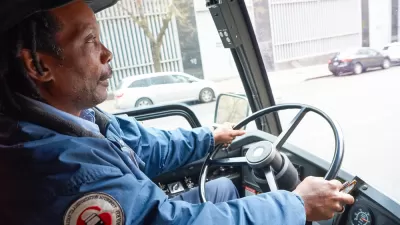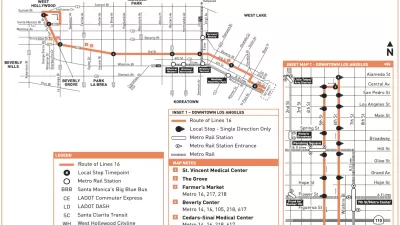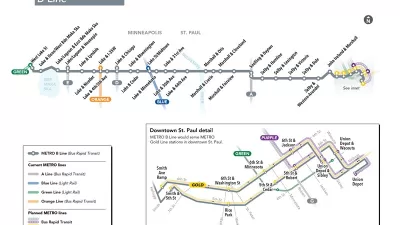The optics of public transit suffered over the weekend, as a few transit agencies have been commandeered by police and even shut down entirely with little or no notice, stranding protesters and essential workers alike.

Public transit has been on the frontline in recent days of unrest in the United States, as police have used buses to transport arrested protesters to jail, but not without meeting resistance from bus drivers who don't want to play that role as a wave of peaceful protests and outbreaks of destruction and violence has swept the nation.
Bus drivers around the country have refused to drive buses full of protesters in custody, and the New York bus drivers union collectively refused to work in that capacity, as did the bus drivers union in Minneapolis.
In another chapter of transit's roles in the upheaval, transit has been played like a chess piece in the conflict. The Los Angeles County Metropolitan Transportation Authority (Metro) shut down all service on the evening of May 30 and early morning of May 31, stranding both protestors and essential workers.
A statement from Metro CEO Phil Washington explained the decision:
“In consultation with Metro Board Chair James T. Butts and in response to L.A. Mayor Garcetti’s directive today to implement a curfew in downtown Los Angeles to help ensure public safety during the George Floyd protests, LA Metro is suspending bus and rail service in the affected protest areas to ensure the safety of both the public and LA Metro employees. This service suspension will become effective immediately and last until 5:30 a.m. [May 31] per curfew guidelines.”
To mitigate some of the collateral damage of the decision, "Metro officials reissued some buses to pick up stranded passengers in specific areas of Los Angeles, and staffers made the rounds to notify riders of the suspension and encourage them to make other arrangements as a result of the emergency," according to an article published by NBC Los Angeles.
Metro issued an apology on May 31, but critics of the decision predicted that the shutdown of service, followed by the use of buses to transport arrested protestors, would have a lasting effect on public trust in the Metro system, as expressed by sources quoted in an article by Laura J. Nelson for the Los Angeles Times.
Los Angeles isn't the only city in the country with a large public transit system operating at diminished capacity as a crowd control measure during the unrest. Chicago is limiting transit access to the Loop and downtown, and also added to the surreal optics of the weekend by raising bridges over the Chicago River in downtown.
FULL STORY: ‘We’re not driving the bus for the cops to arrest protesters’: Bus drivers across U.S. defy police

Study: Maui’s Plan to Convert Vacation Rentals to Long-Term Housing Could Cause Nearly $1 Billion Economic Loss
The plan would reduce visitor accommodation by 25,% resulting in 1,900 jobs lost.

North Texas Transit Leaders Tout Benefits of TOD for Growing Region
At a summit focused on transit-oriented development, policymakers discussed how North Texas’ expanded light rail system can serve as a tool for economic growth.

Using Old Oil and Gas Wells for Green Energy Storage
Penn State researchers have found that repurposing abandoned oil and gas wells for geothermal-assisted compressed-air energy storage can boost efficiency, reduce environmental risks, and support clean energy and job transitions.

Private Donations Propel Early Restoration of Palisades Playground
Los Angeles has secured over $1.3 million in private funding to restore the Pacific Palisades playground months ahead of schedule, creating a modern, accessible space that supports community healing after recent wildfires.

From Blight to Benefit: Early Results From California’s Equitable Cleanup Program
The Equitable Community Revitalization Grant (ECRG) program is reshaping brownfield redevelopment by prioritizing projects in low-income and environmental justice communities, emphasizing equity, transparency, and community benefits.

Planting Relief: Tackling Las Vegas Heat One Tree at a Time
Nevada Plants, a Las Vegas-based nonprofit, is combating the city’s extreme urban heat by giving away trees to residents in underserved neighborhoods, promoting shade, sustainability, and community health.
Urban Design for Planners 1: Software Tools
This six-course series explores essential urban design concepts using open source software and equips planners with the tools they need to participate fully in the urban design process.
Planning for Universal Design
Learn the tools for implementing Universal Design in planning regulations.
Ascent Environmental
Borough of Carlisle
Institute for Housing and Urban Development Studies (IHS)
City of Grandview
Harvard GSD Executive Education
Toledo-Lucas County Plan Commissions
Salt Lake City
NYU Wagner Graduate School of Public Service





























